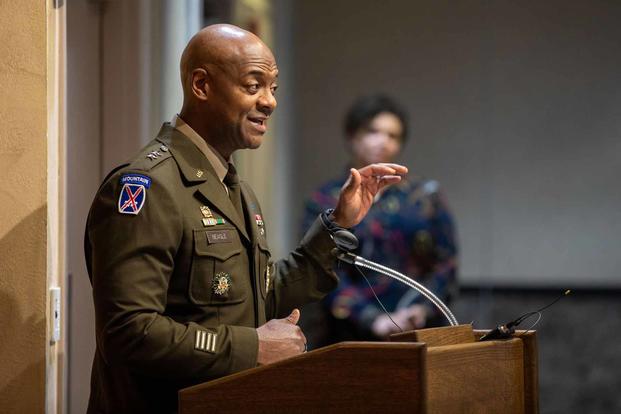The commander of the Army's prestigious 10th Mountain Division wants troops to be less glued to their phones, ordering commanders and senior noncommissioned officers to lay off texting soldiers after duty hours. He wants his formations to be careful about their reliance on phones over concerns the constant barrage of social media and messages are impacting troops' mental health.
Maj. Gen. Milford Beagle Jr., commander of the Fort Drum, New York-based division, on Tuesday issued a memo barring leaders under him from texting or calling their subordinates before 5 a.m. or after 6 p.m., with some caveats for exceptional circumstances, including situations involving the well-being of a soldier.
The memo also seeks to stop soldiers from using phones during meetings and field exercises, though Beagle told Military.com in an interview that his intent isn't an outright ban on phones and more of a strong suggestion for troops to be weaned off their devices. Troops lean on cell phones to conduct daily work too frequently, he added, but said the key concern is cell phones' impact on mental health and leaders having a constant digital leash on soldiers. Instead, he said leaders need to figure out how to put information out to soldiers before they're released from duty.
"It's the stress of the phone. It's all the group texts [soldiers are] getting after hours, sometimes late, that don't amount to anything -- stuff leaders can wait until tomorrow or have better planning." Beagle said. "[Leaders] need to make sure they have their business in order so they can put our proper information at the end of the duty day while they have [soldiers] there."
The memo, he said, is more of an indictment on leaders, not the phones themselves. Some soldiers on social media raised concerns over whether Fort Drum was banning troops from using their phones while on duty, which Beagle said isn't the case. Soldiers can still use phones to pass the time and keep in contact with their families.
"I'm not trying to take your phone at all. If you're checking Twitter, I do it between meetings, that's totally fine," Beagle said. "But what I'm not doing is sending a text to one of my commanders on something I can call them on or we can talk about it the next day. … We're not saying if your wife calls you can't take a call; it's about common sense. That's where folks get confused."
So-called "digital hygiene" is an emerging topic in the medical field, focusing on how much technology in a person's life is too much. Early studies have suggested that constantly engaging with a smartphone can lead to anxiety and depression.
Some soldiers told Military.com that senior noncommissioned officers and commanders are notorious for last-minute or late phone calls or texts, mostly with nonurgent updates or demanding information that could easily wait until the next day. The issue is Army-wide, not limited to the 10th Mountain Division, they said.
"I literally got a text from my [first sergeant] asking who could go to some school and what the status is on some online training for my guys. It was [8 p.m.] and I'm having dinner with my family, and the only way to get him this information is to bother all my guys during their personal time," one noncommissioned officer stationed at Fort Drum told Military.com on the condition of anonymity because they were not authorized to speak to the press. "This could've waited until the next day. And then other times, we might get texts that are hours out of date because someone has poor reception, or whatever."
Sergeant Major of the Army Michael Grinston, the force's top enlisted leader, on Tuesday tweeted an endorsement of Beagle's policy.
"Predictability and training management: Two things that are easy to say, harder to do," Grinston said in a statement on Twitter. "This one makes sense -- what's holding you back from similar rules for your Soldiers?"
-- Steve Beynon can be reached at Steve.Beynon@military.com. Follow him on Twitter @StevenBeynon.
Related: Mental Health Visits Up, Suicidal Behavior Down for Vets Given iPads During Pandemic, Study Finds














